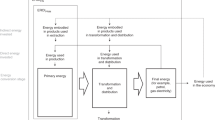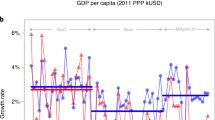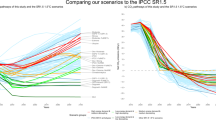Abstract
Oil prices have fluctuated remarkably in recent years. Previous studies have analysed the impacts of future oil prices on the energy system and greenhouse gas emissions, but none have quantitatively assessed how the broader, energy-system-wide impacts of diverging oil price futures depend on a suite of critical uncertainties. Here we use the MESSAGE integrated assessment model to study several factors potentially influencing this interaction, thereby shedding light on which future unknowns hold the most importance. We find that sustained low or high oil prices could have a major impact on the global energy system over the next several decades; and depending on how the fuel substitution dynamics play out, the carbon dioxide consequences could be significant (for example, between 5 and 20% of the budget for staying below the internationally agreed 2 ∘C target). Whether or not oil and gas prices decouple going forward is found to be the biggest uncertainty.
This is a preview of subscription content, access via your institution
Access options
Subscribe to this journal
Receive 12 digital issues and online access to articles
$119.00 per year
only $9.92 per issue
Buy this article
- Purchase on Springer Link
- Instant access to full article PDF
Prices may be subject to local taxes which are calculated during checkout



Similar content being viewed by others
References
World Energy Outlook 2015 (International Energy Agency, 2015).
Chen, W., Hamori, S. & Kinkyo, T. Macroeconomic impacts of oil prices and underlying financial shocks. J. Int. Financ. Mark. Inst. Money 29, 1–12 (2014).
Cunado, J., Jo, S. & Perez de Gracia, F. Macroeconomic impacts of oil price shocks in Asian economies. Energy Policy 86, 867–879 (2015).
Wang, X. & Zhang, C. The impacts of global oil price shocks on China’s fundamental industries. Energy Policy 68, 394–402 (2014).
Baffes, J., Kose, M. A., Ohnsorge, F. & Stocker, M. The Great Plunge in Oil Prices: Causes, Consequences, and Policy Responses (World Bank Group, 2015).
Espinasa, R. & Sucre, C. Cheap Oil? Making Sense of a Competitive Oil Market (Inter-American Development Bank, 2015).
International Energy Outlook 2014 Report Number DOE/EIA-0484(2014) (U.S. Energy Information Administration, 2014).
van Ruijven, B. & van Vuuren, D. P. Oil and natural gas prices and greenhouse gas emission mitigation. Energy Policy 37, 4797–4808 (2009).
Rout, U. K. et al. Impact assessment of the increase in fossil fuel prices on the global energy system, with and without CO2 concentration stabilization. Energy Policy 36, 3477–3484 (2008).
McGlade, C. E. Uncertainties in the Outlook for Oil and Gas. PhD thesis, Univ. London (2013).
Krey, V. Global energy–climate scenarios and models: a review. WIREs 3, 363–383 (2014).
Riahi, K. et al. Global Energy Assessment—Toward a Sustainable Future 1203–1306 (Cambridge Univ. Press and the International Institute for Applied Systems Analysis, 2012).
ADVANCE ADVANCE Integrated Assessment Model Wiki Documentation (University College London and the International Institute for Applied Systems Analysis, 2015); https://wiki.ucl.ac.uk/display/ADVIAM/MESSAGE
European Brent Spot Price FOB (U.S. Energy Information Administration, 2015); http://www.eia.gov/dnav/pet/hist/LeafHandler.ashx?n=PET&s=RBRTE&f=A
Yergin, D. The Prize: the Epic Quest for Oil, Money, and Power (Simon Schuster, 1991).
Rogner, H.-H. et al. Global Energy Assessment—Toward a Sustainable Future 423–512 (Cambridge Univ. Press and the International Institute for Applied Systems Analysis, 2012).
Aguilera, R. F. Production costs of global conventional and unconventional petroleum. Energy Policy 64, 134–140 (2014).
Hartley, P. R., Iii, K. B. M. & Rosthal, J. E. The relationship of natural gas to oil prices. Energy J. 29, 47–65 (2008).
Brown, S. P. A. & Yücel, M. K. What drives natural gas prices? Energy J. 29, 45–60 (2008).
Erdős, P. Have oil and gas prices got separated? Energy Policy 49, 707–718 (2012).
Asche, F., Oglend, A. & Osmundsen, P. Gas versus oil prices the impact of shale gas. Energy Policy 47, 117–124 (2012).
Correlations Between Daily Futures Price Changes of Crude Oil and Other Commodities Generally Rose in Recent Years (U.S. Energy Information Administration, 2015); http://www.eia.gov/finance/markets/financial_markets.cfm
European Union The Impact of the Oil Price on EU Energy Prices (Directorate General for Internal Policies, 2014).
Kriegler, E. et al. The role of technology for achieving climate policy objectives: overview of the EMF 27 study on global technology and climate policy strategies. Climatic Change 123, 353–367 (2014).
McCollum, D., Krey, V., Kolp, P., Nagai, Y. & Riahi, K. Transport electrification: a key element for energy system transformation and climate stabilization. Climatic Change 123, 651–664 (2014).
Smith, P. et al. in Climate Change 2014: Mitigation of Climate Change (eds Edenhofer, O. et al.) 811–922 (IPCC, Cambridge Univ. Press, 2014).
Rogner, H.-H. An assessment of world hydrocarbon resources. Annu. Rev. Energy Environ. 22, 217–262 (1997).
Trends in Global CO2 Emissions: 2014 Report (PBL Netherlands Environmental Assessment Agency and European Commission, Joint Research Centre, 2014).
IPCC: Summary for Policymakers. In Climate Change 2014: Mitigation of Climate Change (eds Edenhofer, O. et al.) (Cambridge Univ. Press, 2014).
Synthesis Report on the Aggregate Effect of the Intended Nationally Determined Contributions (United Nations Framework Convention on Climate Change, 2015).
Riahi, K. et al. Locked into Copenhagen pledges—implications of short-term emission targets for the cost and feasibility of long-term climate goals. Technol. Forecasting Soc. Change 90, 8–23 (2015).
The Emissions Gap Report 2014. A UNEP Synthesis Report (United Nations Environment Programme, 2014).
McJeon, H. et al. Limited impact on decadal-scale climate change from increased use of natural gas. Nature 514, 482–485 (2014).
Capros, P. et al. The impact of hydrocarbon resources and GDP growth assumptions for the evolution of the EU energy system for the medium and long term. Energy Strategy Rev. 6, 64–79 (2015).
McGlade, C. & Ekins, P. The geographical distribution of fossil fuels unused when limiting global warming to 2 ∘C. Nature 517, 187–190 (2015).
McCollum, D., Bauer, N., Calvin, K., Kitous, A. & Riahi, K. Fossil resource and energy security dynamics in conventional and carbon-constrained worlds. Climatic Change 123, 413–426 (2014).
Keppo, I. & Strubegger, M. Short term decisions for long term problems—the effect of foresight on model based energy systems analysis. Energy 35, 2033–2042 (2010).
Messner, S. & Schrattenholzer, L. MESSAGE-MACRO: linking an energy supply model with a macroeconomic module and solving it iteratively. Energy 25, 267–282 (2000).
Meinshausen, M., Raper, S. C. B. & Wigley, T. M. L. Emulating coupled atmosphere-ocean and carbon cycle models with a simpler model, MAGICC6—Part 1: Model description and calibration. Atmos. Chem. Phys. 11, 1417–1456 (2011).
Jewell, J., McCollum, D., Krey, V. & Riahi, K. Report on Improving the Representation of Existing Energy Policies (Taxes and Subsidies) in IAMs Deliverable 3.1. (ADVANCE, 2014); http://www.fp7-advance.eu/sites/default/files/documents/WP3/ADVANCE_Deliverable_D3.1_Submission.pdf
World Energy Outlook 2014 (International Energy Agency, 2014).
Villar, J. A. & Joutz, F. L. The Relationship Between Crude Oil and Natural Gas Prices (Energy Information Administration, Office of Oil and Gas, 2006).
Acknowledgements
The authors acknowledge funding provided by the ADVANCE project (FP7/2007–2013, grant agreement No. 308329) of the European Commission. The International Energy Agency (in particular A. Bromhead, L. Cozzi, N. Selmet and G. Zazias) provided critical data support, which made the price calibration possible in the model. P. Kolp and M. Strubegger of IIASA are also recognized for their assistance with model code development.
Author information
Authors and Affiliations
Contributions
D.L.M, J.J., V.K. and K.R. designed the research. J.J. contributed data for the modelling. D.L.M. and V.K. implemented the modelling. M.F. and M.B. provided feedback on the scenarios, in particular assisting with the framing. All authors contributed to writing the manuscript.
Corresponding author
Ethics declarations
Competing interests
The authors declare no competing financial interests.
Supplementary information
Supplementary Information
Supplementary Tables 1–7, Supplementary Figures 1–7, Supplementary Discussion, Supplementary Methods and Supplementary References. (PDF 1250 kb)
Rights and permissions
About this article
Cite this article
McCollum, D., Jewell, J., Krey, V. et al. Quantifying uncertainties influencing the long-term impacts of oil prices on energy markets and carbon emissions. Nat Energy 1, 16077 (2016). https://doi.org/10.1038/nenergy.2016.77
Received:
Accepted:
Published:
DOI: https://doi.org/10.1038/nenergy.2016.77
This article is cited by
-
Constructing artificial mimic-enzyme catalysts for carbon dioxide electroreduction
Science China Chemistry (2022)
-
Investigating the determinants of carbon emissions in the USA: a state-level analysis
Environmental Science and Pollution Research (2022)
-
Extending energy system modelling to include extreme weather risks and application to hurricane events in Puerto Rico
Nature Energy (2021)
-
What went wrong? Fracking in Eastern Europe
Discover Energy (2021)
-
Greenhouse gas emissions–crude oil prices: an empirical investigation in a nonlinear framework
Environment, Development and Sustainability (2019)



